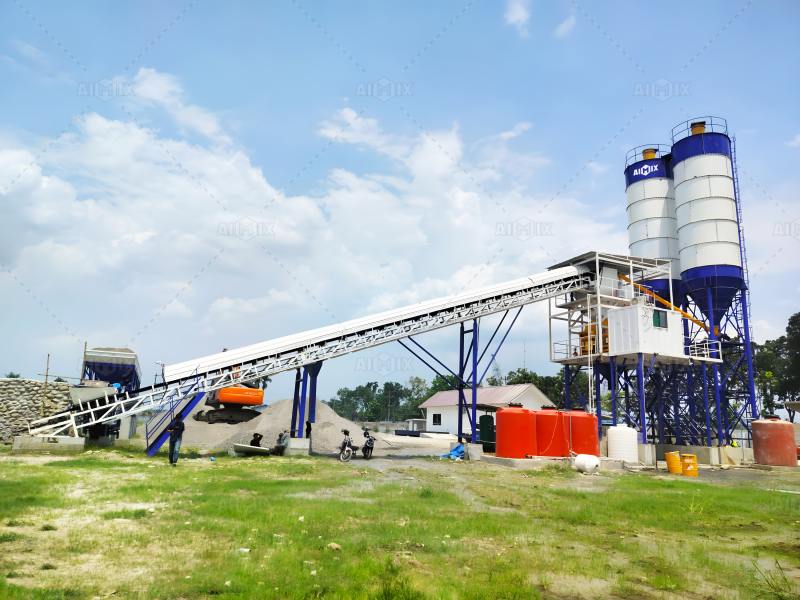Setting up a concrete batching plant involves more than just selecting equipment and finalizing the site layout. One of the most critical—and often underestimated—factors impacting your total concrete batch plant cost is navigating local regulations and obtaining the necessary permits. Compliance with environmental, safety, zoning, and operational laws not only ensures legal operation but also directly affects your initial investment and ongoing expenses.
In this article, we explore how regulations influence the overall cost of establishing a concrete batching plant, what key permits you need to consider, and how working with experienced concrete batching plants manufacturers can help you manage these complexities and control costs.

Concrete batching plants are considered industrial facilities with potential environmental impacts, including dust emissions, noise, wastewater discharge, and traffic congestion. Therefore, most countries and municipalities impose a range of permits and regulations before you can legally operate.
Common regulatory areas affecting your plant setup include:
Each of these permits requires time, documentation, fees, and sometimes additional investment in compliance technologies, all adding to your concrete batch plant cost.
Concrete batching operations generate dust from material handling, mixing, and transport. Many jurisdictions require dust control measures such as baghouse filters, water spray systems, or enclosed conveyors. Obtaining air permits often involves demonstrating compliance with particulate matter limits.
Cost impact:
Installing dust suppression equipment can add $20,000 to $100,000+ depending on plant size and local standards. Permit application fees and ongoing monitoring costs also contribute to expenses.
Water is used extensively for mixing concrete and cleaning equipment. Regulations may require treatment or recycling systems to prevent harmful runoff into local waterways.
Cost impact:
Implementing closed-loop water recycling systems or wastewater treatment facilities may increase your concrete batch plant cost by $10,000 to $50,000 or more. Ongoing water quality testing and permit renewals also require budget consideration.
Before construction, you must verify that your chosen site is zoned for industrial use compatible with concrete batching operations. Some municipalities have strict zoning laws or require public hearings.
Cost impact:
If your site is not pre-approved, rezoning or variance requests can delay your project and add legal fees. In some cases, you may need to select more expensive land in industrial parks designed for such plants.
Concrete plants generate noise from mixers, conveyors, trucks, and other machinery. To comply, you may need to install sound barriers or locate equipment away from residential areas.
Cost impact:
Noise mitigation measures can add tens of thousands of dollars to your setup costs, especially if operating near sensitive zones.
Ensuring worker safety and community protection involves providing proper training, safety gear, signage, and emergency response plans.
Cost impact:
While not always a large upfront cost, investing in safety equipment and ongoing training programs contributes to operational expenses and helps avoid costly fines or shutdowns.

Regulatory compliance increases the concrete batch plant cost in three main ways:
For example, a medium-sized plant might see its total setup cost increase by 10–30% due to environmental permitting requirements alone.
Selecting the right concrete batching plants manufacturers is critical to managing permitting-related costs. Reputable manufacturers typically:
Many leading China concrete batching plant manufacturers, such as Aimix and others, have extensive experience exporting equipment globally with environmental compliance features built in. This expertise helps buyers avoid unexpected costs and delays.

While permits and environmental regulations add complexity and cost to establishing a concrete batching plant, they are essential for sustainable, legal, and safe operations. Understanding the specific permits required in your area and factoring their costs into your concrete batch plant cost estimation prevents costly delays and legal issues down the road.
Partnering with knowledgeable concrete batching plants manufacturers, especially those with international experience like leading China concrete batching plant suppliers, can help you navigate these challenges efficiently. By investing in compliant, high-quality equipment and planning proactively, you safeguard your investment and set your concrete batching plant up for long-term success.
Ready to explore compliant and cost-effective concrete batching plants? Contact reputable manufacturers today to get tailored solutions that fit your budget and regulatory environment.